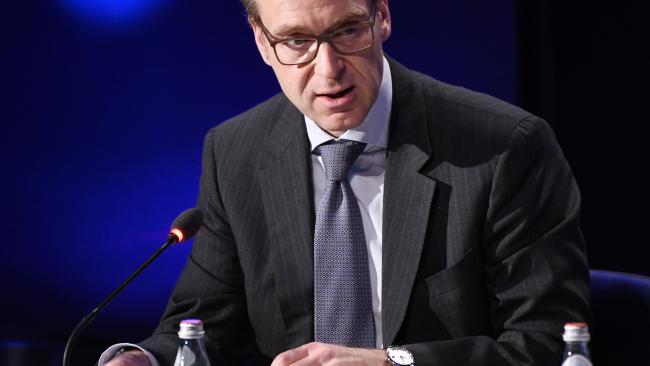(Bloomberg) -- Bundesbank President Jens Weidmann argued that the European Central Bank will be able to phase out asset purchases after September if the economy continues to develop as expected, seeing recent market volatility as no cause for concern.
“If the expansion progresses as currently expected, substantial net purchases beyond the announced amount do not seem to be required,” Weidmann said in a speech in Frankfurt. “We will monitor closely any impact foreign exchange rate movements might have on our primary target of price stability” and should not “allow ourselves to become unsettled by the decline in equity prices we have just witnessed.”
With robust and broad-based economic growth slowly rekindling price pressures in the 19-nation bloc, the ECB’s Governing Council is getting closer to scaling back stimulus. President Mario Draghi told lawmakers this week that policy will evolve in a data-dependent and time-consistent manner, claiming it is too soon yet to claim victory in inflation.
Weidmann cited countries’ efforts to improve competitiveness through wage restraint and migration easing labor-market tensions as reasons for sluggish price developments, adding that low inflation is not a unique problem for the currency region.
“Given the rather subdued inflationary pressure at present, an accommodative monetary policy stance remains appropriate in the euro area,” he said. “And even after the net purchases have ended, the monetary policy stance will remain loose.”
Policy Communication
Investors are listening to policy makers’ every word for clues on how stimulus will be adjusted. After an account of the Governing Council’s December meeting showed officials were considering having a debate about a gradual change in their so-called forward guidance early this year, the euro soared and bonds slid.
Draghi said in his Jan. 25 press conference that some policy makers were surprised by the market reaction, adding that no discussions on communication had taken place thus far, beyond talking about when to have that conversation.
“If central banks are to use communication as a policy tool, they must not shy away from necessary guidance for fear of market backlash,” Weidmann said on Thursday.
Peter Praet, the ECB’s chief economist, commented in a Twitter question-and-answer session that forward guidance on interest rates “will naturally increase in importance.”
Weidmann signaled he was optimistic about the ability of wages to bolster price pressures in the medium term, and pointed to the recent pay agreement in Germany’s metalworking and electrical engineering industries as an example of how declining slack in the labor market feeds through to higher remuneration.
“Not only is it in keeping with the expectations we based our forecast on: in my opinion, it also demonstrates that the Phillips curve does by all means have informative value where Germany is concerned,” Weidmann said.
He said that the recent appreciation in the euro is “unlikely to jeopardize the expansion” in the currency bloc, even as it makes exports more expensive. He also called on governments to not view public finances as better than they actually are, warning that higher interest rates in the future could make current public-debt ratios a burden.
(Updates with Twitter comment from Peter Praet in ninth paragraph.)
